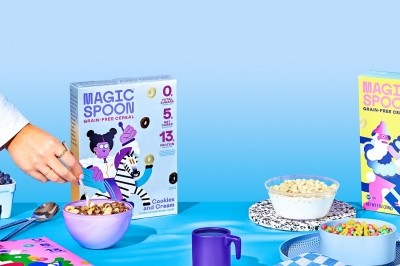IFIC: More Americans are dieting, but fewer consider the healthfulness of what they consume

Instead, Americans appear to rely more on undefined marketing claims, such as ‘natural’ and ‘clean,’ when selecting products now or use online tools or mobile apps to help them improve their diet and physical activity, IFIC found in its 2022 Food and Health Survey published this week.
In its 17th year, the long-term study surveyed about 1,000 Americans online in late March and early April and compares current attitudes and behaviors to those of prior years.
According to the study, 52% of Americans report following a diet or eating pattern in the past year – a “steep uptick” from the 39% who reported the same last year, the 43% who did so in 2020 and the 38% in 2019, said Ali Webster, the director of research and nutrition communication at IFIC.
“This increase is mainly driven by customers who are under the age of 50,” said Marisa Paipongna, IFIC’s research and nutrition coordinator.
“Interestingly,” she added, “we also see changes in the types of eating patterns and diets that Americans are likely following."
'Clean-eating'
Shooting to the top of the diet list this year is 'clean eating,' to which 16% of respondents say they adhere, followed by mindful eating – a new option for this year – at 14%, and calorie-counting, which increased from last year with 13% of dieters citing it.
“For context, last year the top diets were calorie counting, clean eating and intermittent fasting, so we can see there’s a little bit of rearranging with clean eating rising to the top in terms of popularity,” Paipongna said.
Lower on the list, but rising, are plant-based (at 12%), gluten-free (9%), flexitarian and carb-cycling (both at 7%), the low-sodium DASH diet (4%) and cleanse and vegan (both 2%). Dropping on the list are more high-profile options, including keto or high-fat, which was cited by 7% of dieters and low-carb at 6%.
The top reasons for dieting remain the same, but appear reversed compared to last year, with a desire to protect long-term health or prevent future health conditions taking the top slot and being listed by 35% of dieters and a desire to lose weight dropping to second place at 34%, according to the study.
Much lower on the list, but gaining traction from last year, are a desire to follow the Dietary Guidelines for Americans and My Plate recommendations, cited by 16% of survey respondents, and a news article, blog post or study discussing the effects of a selected eating style motivated 15% of respondents.
Paipongna noted “some really interesting generational differences” for why people follow a diet, with boomers more often wanting to protect their health and prevent future health conditions and younger Gen Zers wanting to improve their physical appearance as well as better manage health conditions.
Nearly of third of consumers changed their diet to manage stress
Stress also influenced more than a third of survey respondents approach to diet and nutrition, according to the study, which looked at the correlation between stress and food choices for the first time this year.
“We see that over half of people that we surveyed reported feeling stressed in the past six months, with younger generations being much more likely to have felt higher levels of stress as compared to Baby Boomers,” Webster said.
Of those who reported being at least somewhat stressed over the past six months, about 30% said they changed their nutrition or diet to reduce stress – with the bulk (54%) saying the simply tried to eat healthier and 37% reporting that they adopted a specific dietary pattern.
Moving down the list of diet changes to manage or reduce stress, Webster said three out of 10 respondents consumed less caffeine and one in every four cut back on alcohol consumption.
Also notable, 30% took dietary supplements that claimed to reduce stress or the effects of stress, such as headaches or fatigue, the report found.
In addition, IFIC found 18% of consumers seek emotional and mental health benefits from food and beverages, while 26% look for the related benefit of improved sleep.
While mental health support is gaining traction, far more consumers at 37% seek energy or to counter fatigue as the top health benefit they seek from food, beverages and nutrients. In second place is weight loss and weight management at 30% and digestive health comes in third with 29%, followed closely by heart health benefits, which was cited by 28% of consumers.
The percent of consumers who think about healthfulness of food is dropping
While some consumers are using foods and beverages to manage their health, the study revealed significant gaps in knowledge about what is healthy and how much thought consumers actually give to the products that they consume.
According to the research, about 86% of consumers think at least a little about the healthfulness of the foods and beverages they consume, but this is a significant drop from the 93% who did so ten years ago, Webster noted.
Likewise, of those who thought about the healthfulness of the products they consume, only 40% do so ‘a lot,’ which is about the same as the percentage of people who also think about the healthfulness of ingredients ‘a lot,’ according to the study.
“Millennials are more likely to have thought about many of these issues, particularly in comparison to Boomers,” Webster said. “Boomers don’t see to have been prioritizing these as much as younger generations.”
One reason more people might not consider the healthfulness of what they consume could be because they are confused or unsure what nutrition information they can trust, the study suggests.
If found about seven in 10 Americans believe because nutrition information seems to keep changing, it is hard to know what to believe. While this figure could be disheartening, Webster noted it is slightly better than ten years ago when three quarters of people thought this way.
As consumers look for answers, many are turning to online tools and mobile apps which 63% either strongly or somewhat agree can help them improve their diet and physical activity – up from 57% in 2012, according to the study.
Lack of trustworthy healthy nutrition and lifestyle information also could contribute to more people preferring to take medication for a health condition than change their lifestyle – an attitude that 38% strongly or somewhat agree with, which is more than two times the 16% who said the same 10 years ago, according to the study.
Why is ‘natural’ so appealing to consumers?
In lieu of trustworthy nutritional information, an increasing number of consumers are looking for products labelled as ‘natural’ and ‘clean,’ according to IFIC.
Even though natural does not have a regulatory definition and many consumers interpret it broadly, it resonates with consumers when they buy products both in person and online, Webster said, noting that 39% of consumers say they regularly buy products labelled as natural while 27% say the same about label claims for ‘clean ingredients.’
“We dug a little bit deeper into the natural aspects, because we wanted to know exactly what this label is doing for people – why is it so influential to them?,” Webster said. “The top responses that we got is that people believe that foods labelled as natural are generally healthy for them [54%].”
The study also revealed that 47% of consumers seek foods labelled as natural because they want to avoid artificial ingredients, 38% do so because the believe natural foods are generally better quality than the alternatives are 36% are worked about potentially harmful additives or chemicals in food as well as perceive them as better for the environment.














